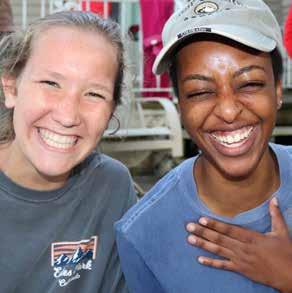
2 minute read
East African missionary kids
BY WORKU HAILEMARIAM
Worku Hailemariam is the Director of SIM’s East African Office in Addis Ababa, Ethiopia.
Advertisement
Wongel Mulugeta, Wongel (Gospel) Zeleke, William Cary, Ephrem Getachew – these are the names of some of our missionary kids that represent the message of the gospel and the lives of missionaries. Through these names, our missionaries remind themselves of their calling.
It is vital for missionary families and the sending church and mission to work together closely in the area of preparation, including expectations about the challenges ahead and how to tackle them together. As it is, missionary families are encountering challenges on both the sending and receiving sides.
Language
African MKs are typically expected to speak a minimum of three languages. MKs from Ethiopia speak Amharic, our working language. In addition, they learn the ethnic language of their parents; an international language such as English, French, or Arabic; and finally, the national language of the country of service, such as Urdu or Chinese. In some cases, an ethnic language from the country of service is added.
On one hand, children exposed to three or more languages during their early years will more easily acquire even more languages. On the other hand, in the short-term, too many languages can cause some delays in education because mastery of the language of education is not complete.
Cultural challenges
Every missionary expects to live in a foreign culture, but the mixed culture of the multi-national missionary community can be a surprise. In some fields, the kids join very diverse communities with no clear minority or majority culture. However, in most places the African MKs are a minority. This dynamic can pave the way for loneliness and isolation. One MK on home assignment said, “We wish to stay in our country so that we can have more friends here.”
Education
Lack of finances is the primary issue in children’s education. The sending church and the extended family expect that MKs will access higher quality education outside their home country. They assume that wherever the mission serves, good schooling is available. A second assumption is that the cost of education is manageable. However, neither assumption is a reality.
On one hand, missionaries struggle to pay for their children’s education; on the other hand, churches struggle to add any more financial support. As a result, missionary parents carry the additional burden of raising education funds, an often overwhelming endeavour.

Despite the high cost of missions, I can testify that some African churches are supporting their missionaries with great sacrifice. They are not supporting according to how ‘affordable’ it is for them. Rather, as Paul puts it in 2 Corinthians 8:3: ‘For I testify that they gave not only what they could afford but far more, and they did it of their own free will.’
I have seen that some of the churches, though their buildings are in poor condition and there are other priorities, are devoted to giving first priority to missions.
As we have visited missionaries sent from our East African Office, we have observed amazing potential and resiliency among our MKs. Some may become missionary pilots, cross-cultural ministers, and teachers of other MKs. We could produce a second generation of missionaries.
PLEASE PRAY:
--For solutions to education for our East African MKs.
--For sending churches and extended families to work together in supporting whole families to go.
--For resilience, joy and spiritual growth for each MK.









